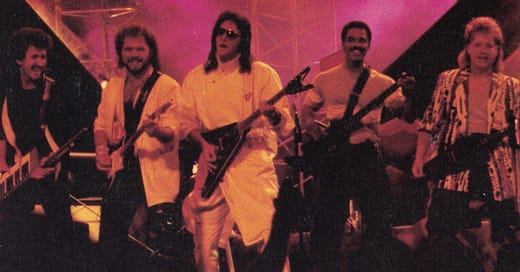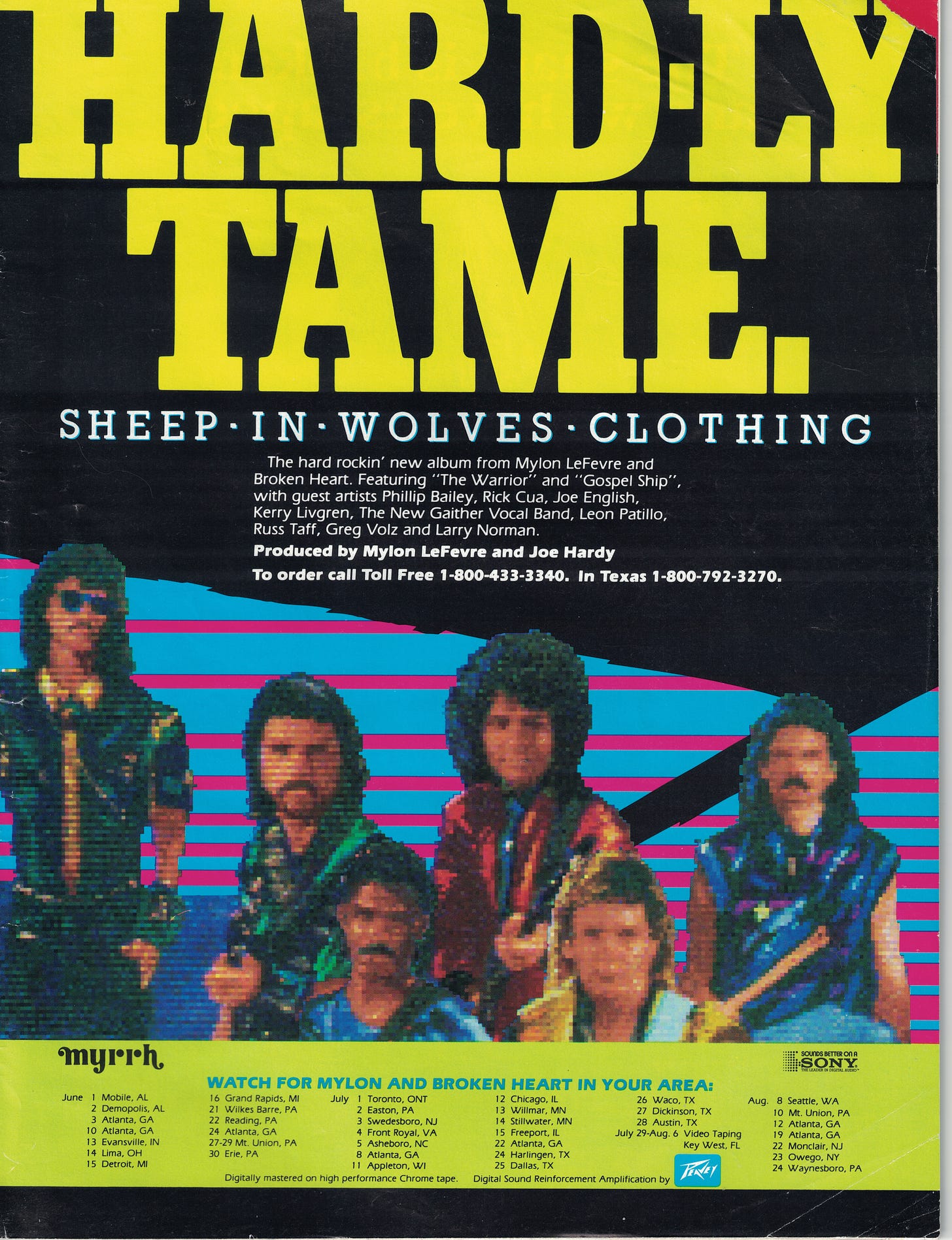In Memory of Mylon LeFevre (1944-2023)
A look at his mid-80s releases, "Sheep In Wolves Clothing" and "Look Up" and how they engaged in the crossover era.
Thanks to all of you who have become paid subscribers to #GodsMusicIsMyLife! This newsletter is intentionally free for all—-there are no entries blocked by a paywall. You can support this work by becoming a paid subscriber for $8 a month. To do so, simply click here!
Some music enters your world and it becomes a part of your DNA, a permanent part of your infrastructure.
That’s what hearing Mylon LeFevre’s Sheep In Wolves’ Clothing (Myrrh Records) was like for me. It was the year of the great CCM album—1985—and just as Amy Grant’s Unguarded and Russ Taff’s Medals were also breaking down all kinds of boundaries, Sheep In Wolves Clothing hit like a bolt of lightning.
My sister, Hillary, and I would hide away in her room, listening as quietly as we could. While my mother was the one who brought Mylon LeFevre’s music into my world, there was a fine line we had a walk when the music became too electric…when it teetered too far from what was perceived as anointed and became rebellious (yes, apparently, it was a vibe). We were desperate for music that was competitive with what our peers were listening to. We were even more desperate for artists who didn’t look like they’d wandered off of a clone farm. Mylon with his leather jackets and parachute pants looked like he’d wandered in from MTV and that certainly appealed to us as ten year olds.
I saw Mylon in concert in 1984 and will never forget a young friend of my mother’s storming out of the concert before it was over, in a flurry of tears, because she couldn’t reconcile the freedom we were experiencing in the arena with the fear she’d been programmed to feel when she heard rock music. (The same friend also had a breakdown when we saw Footloose months later, which centered around the same theme). Mylon and Broken Heart’s intensity was beyond the beat. “Rock uses words of the world: If it feels good, do it. Jesus said deny yourself. The church has translated that into not having fun. But I don’t think that’s what he meant,” he told the Columbus Enquirer.
It was hard to not turn Sheep In Wolves Clothing all the way up. The buoyancy with which it was recorded seemed to leap out of the speakers. From the cascading drum programming of the album’s opener, “Crucible of Love” to the rock and roll throwdown of “Gospel Ship” (with guest appearances from Leon Patillo, Russ Taff, Greg X. Volz among others), to the album’s big ballad closer, the anthemic “The Warrior,” the album had all the crunch of Bon Jovi and the polish and slickness of Huey Lewis & The News.
While I’d like Mylon’s first three releases of the eighties (two of which were Grammy nominated), he was clearly navigating the fine line as well. His ballads like “More” and “My Heart Belongs To Him” got regular play on our local Christian radio station during the week, but his rocker “Free Man” was relegated to Saturday afternoon play on the “rock” show. We were most exposed to Mylon’s music on the PTL Network’s Friday evening video show, Sound Effects, where we got to see Mylon and his ever-cool aviator glasses in “Stranger to Danger, the video for the single from 1982’s Brand New Start. Sheep In Wolves Clothing, however, pulled no punches, rocking from start to finish, a perfect rock-pop fusion record that Christian circles heard as far more aggressive than it actually was. “Everybody told me ‘You gotta get out of that rock ‘n’ roll.’ I cut all my hair off. Look at my first album—I was wearing a suit and tie. I did everything I could to please the Christians,” he told CCM in 1986.
"‘Wolves’ is my first real step into the music of 1985. That happens when you are somewhat older than what is still essentially a teenage market,” he told Billboard columnist Bob Darden. “I’ve finally made my peace with the new technology. I’ve finally gotten used to the idea of sitting down at a typewriter and playing the drum part. But it is the desire of my heart to communicate to the masses, and that means learning how to drive a computer. I’m used to B-17s; now I’ve gotta learn to fly a supersonic jet. Its exciting to feel like I’m finally mastering this state-of-the-art equipment. I’m not tentative about it anymore.”
Sheep in Wolves Clothing rose to #4 on the Christian albums chart, aided by “He Is Strong” and “The Warrior,” two of the adult contemporary singles that Christian radio could get behind, and the contagious “Trains Up In The Sky,” that Christian radio’s rockier formats played for over a year.
While Amy Grant crossed over by seeking commonality with a secular audience through songs about life and love, LeFevre was also approaching the secular market. While Sheep In Wolves Clothing had, what Billboard called, “fever for evangelism,” LeFevre identified as a rocker—after all, he’d recorded one of the first gospel rock albums, ever, in 1970—and believed that in itself would reach unchurched audiences. He explained to reporter Jon Ferguson, “When I became a Christian, I didn’t become a gospel singer. I’m a rock ‘n’ roller. We’re going to rock their socks off. The Lord doesn’t mind.” He further explained to Billboard, “We’re not going to holler and shout and preach in concert. But we are going to share the wonderful things God has done for us. A lot of Christian groups preach and they’re not very good at it. You gotta do whatever you do for God right.”
But he also took note of Grant’s approach. While he and Broken Heart were beginning work on Sheep In Wolves’ Clothing in 1984, he inked a deal with CBS Records (separate from their agreement with Myrrh Records) to record a mainstream album. Sheep In Wolves Clothing and the CBS album were actually recorded at the same time. Mylon said, “Depending what side of the lyric fence they fell on, that’s how we decided which album to put them on.”1 “It’s a Christian album, but you really have to know the Word to know it. CBS ain’t gonna know it. Every song on there—every note on there—is played by born again, spirit-filled Christians. We had a good time making the record. It’s an anointed record and it’s got a good message, but it’s very shallow. We really avoided certain words and phrases, you know. It’s just about themes,” he expounded to CCM.
But the self-titled album which re-branded Mylon and Broken Heart as Look Up came out in 1986 and was sadly overlooked. Between the non-descript cover art and a name that made the group all but anonymous, the album came and went without landing on anyone’s radar. But listening to it alongside Sheep in Wolves’ Clothing is a revelation. It is every bit as visionary as Amy Grant’s Unguarded, telling relatable stories about life (“It’s Alright With Me”), love (“San Francisco”) and introspection (“Peace Begins Within”) against a backdrop of state-of-the-art, danceable rock-pop. Albums like Unguarded or Look Up undo the notion of Christian exceptionalism. They’re relational. They don’t exalt one’s beliefs as the only way. They simply relay one’s experience and moral code as a way. A choice.
Co-produced by LeFevre, Joe Hardy and another Christian rock super-group, DeGarmo & Key, Look Up featured guest appearances from DeGarmo and Key as well as The Bar Kays, Philip Bailey of Earth, Wind & Fire, Jimmy Jamison of Survivor and Kerry Livgren of Kansas. How it managed to slip through the cracks is something of a tragedy, given its broad concept and the number of artists who showed up to support it. In an interview, LeFevre said that there was a video for one of the songs that would have included a handful of the aforementioned artists as well as Rick Cua and Donna Summer, but it doesn’t appear to have ever been released.
When Mylon and Broken Heart returned with 1987’s Crack the Sky (which won the group a Grammy Award), however, the tides had changed. The Christian music industry had divested from their crossover investment and re-focused their efforts on music singularly targeting the church-based audience. In the wake of two major scandals involving tele-evangelists, one of which disrupted one of the few evangelical outlets friendly towards Christian rock, the Christian music industrial complex drove audiences towards, as one manager told Billboard, “safer, more conventional music, more praise and worship music.”
In that 1985-86 moment, Mylon and Broken Heart represented the possibility of being a person of faith who was not estranged from the popular culture. He told CCM, “Rock ‘n’ roll is what I do. I put on a good show. I entertain those people. I have a good time with them. It is very frustrating to some people who are not very free for other people to have a good time. We celebrate Christ because that’s the way I feel about what He’s done for me.”2
In light of what’s become of contemporary Christian music, Mylon’s death this past weekend has made me think even more deeply about this crossover moment that I focus on so frequently. What has retreating into the silo of the church done to stifle and silence the artists who understood the necessity of connecting to the external world? How has the laziness of selling God to the already-converted halted reciprocal exchange and relationship between people of faith and those who hold any range of diversity or divergent beliefs?
As I listen to Sheep In Wolves Clothing and Look Up now, I do so now from a place of expanded consciousness—not through the filter of fundamentalism that I was raised in. I still hear the seeds of truth, the ecstasy of gospel and its descendent, rock and roll, and a theology that is more self-determined than most organized structures want any of us to believe.
I’ll always see Mylon as one of the authentic artists who maintained a human center. “….People shouldn’t think of me as some sort of spiritual giant,” he said to CCM in 1988. “I know that I’m still proud. I still want to have platinum records and win Grammys. Ain’t no use lying about it. God has called me to be a humble servant and I don’t always do a real good job of it. I’m just trying to be faithful to what God’s called me to do, to keep my house in order, and to mind my own business without getting into too much controversy. But sometimes, controversy comes looking for you. If you get asked questions, you gotta say what you think. Ain’t no other way to do it.”3
Darden, Bob, “Gospel Lectern,” Billboard, Aug. 24, 1985. pg. 36. Print.
Styll, John, “The Solid Rocker,” CCM, March 1986, pg. 19. Print.
Brown, Bruce, “A Child of the Father,” CCM, October 1988, pg. 21. Print.





The execs didn't know what they were seeing. Ecstasy and grace come from the same place.
Tim, I love when you tell your own story/ies. And Mylon's story is also fascinating. May be rest in peace and power. I do believe in the last video that was some folk drumming around a fire and chanting to Yemaya! Am I correct that there was acceptance and understanding in his song?